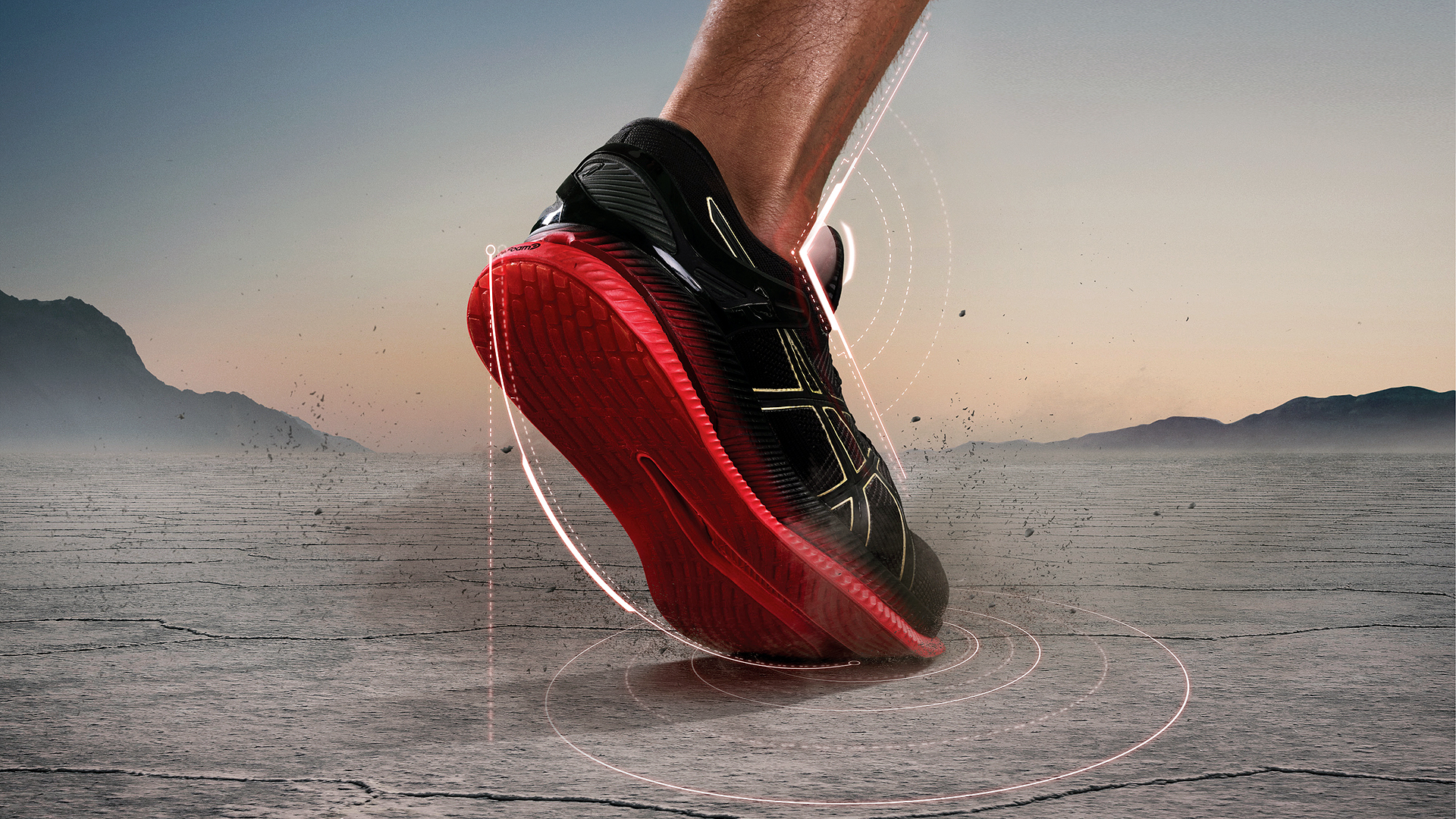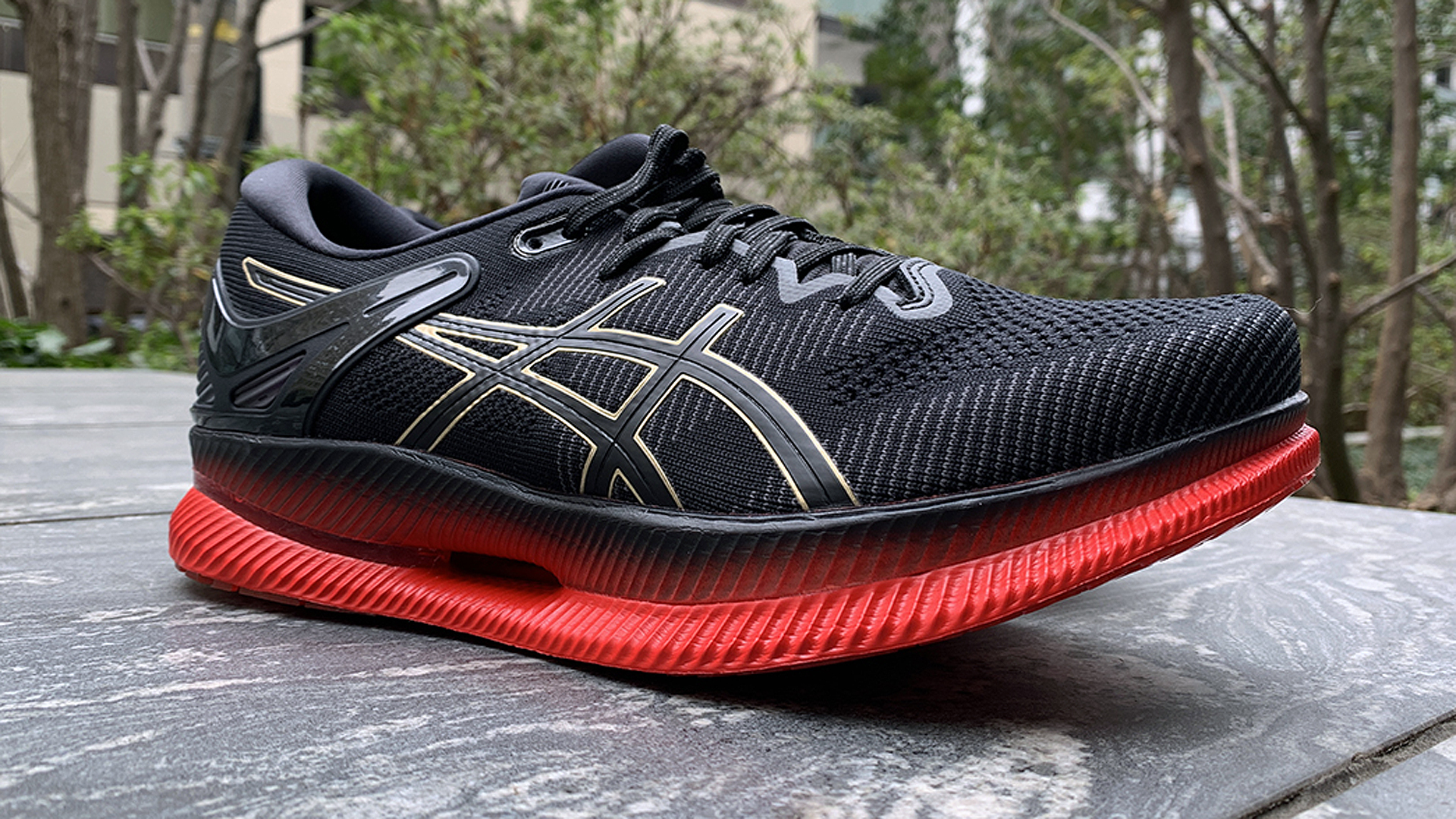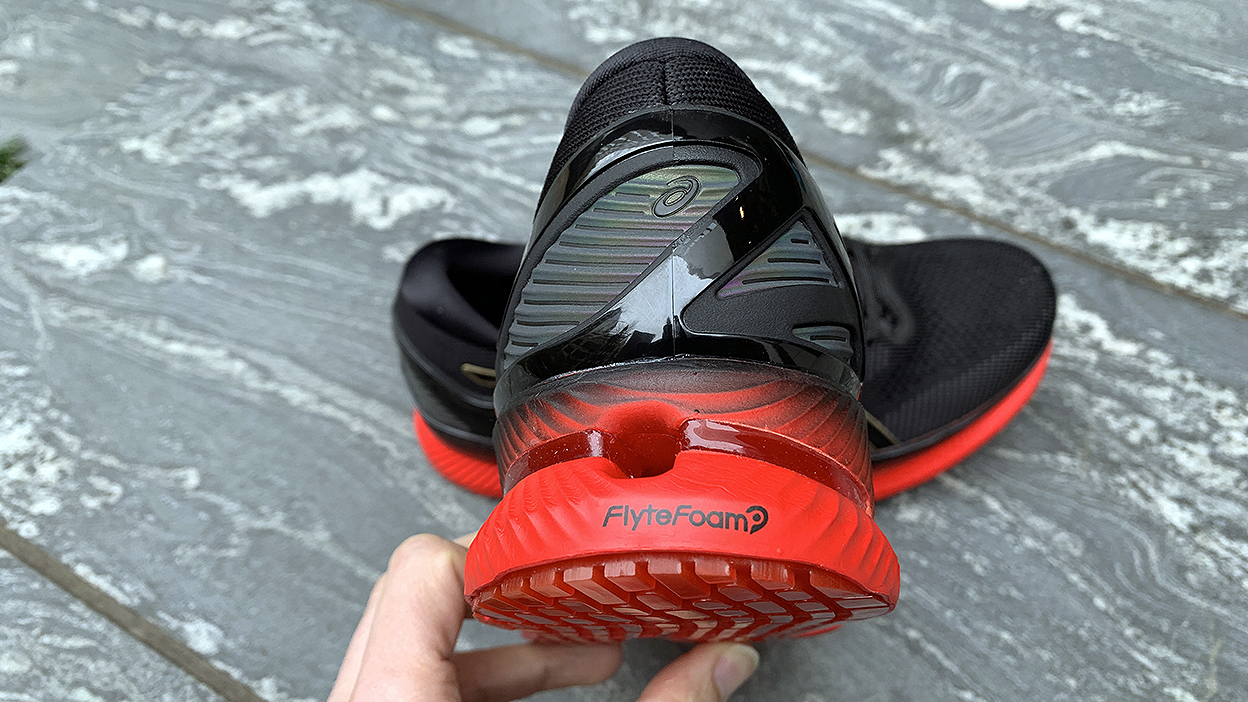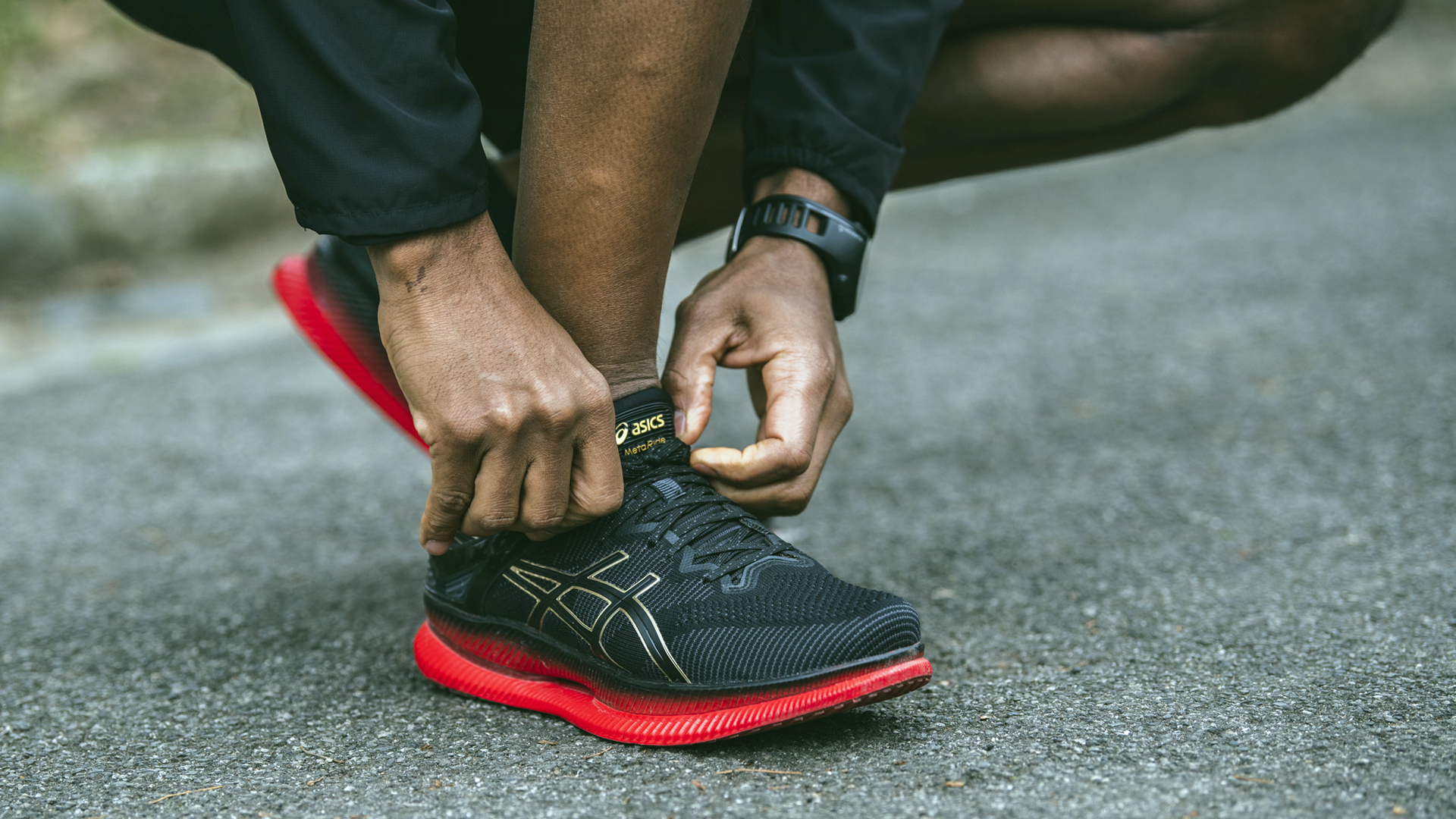ASICS MetaRide review (first run verdict): a running shoe that's ahead of the curve
Outrageously curved ASICS MetaRide is here to help you run longer


Get all the latest news, reviews, deals and buying guides on gorgeous tech, home and active products from the T3 experts
You are now subscribed
Your newsletter sign-up was successful
Tokyo, Japan: ASICS MetaRide is a new, curved, ‘energy saving’ shoe intended to make every runner more efficient. If you can cut the energy you waste when you run, you should be able to go longer and get more enjoyment from your miles. That’s the thinking behind ASICS’ brand new running shoe, the MetaRide.
The latest offering from ASICS' squeaky clean labs in Japan cuts a dash, with a curved shape that's bidding to change the look of long-distance running footwear. It's still recognisably a running shoe but there's a touch of Masai Barefoot Technology or even the Fitflop about the look of the MetaRide. But here, that bulbous, curved sole is specially designed to help runners of all abilities – and particularly heel strikers – move with improved efficiency.
I've just run through Tokyo in a pair, and I've got plenty to tell you, even in my jet-lagged and tired state.
- Best running shoes: to wear
- Best running watch: to track
- Best running headphones: to soundtrack
ASICS MetaRide: design

ASICS MetaRide: why do we suddenly crave a banana?
This MetaRide's new curved Guidesole construction encourages a heel-to-toe rocking motion each time your foot strikes the ground, making your running gait more efficient, ASICS says, and reducing wasted energy by 'almost a fifth' compared to normal running shoes.
Interestingly while other brands’ sole technology tends to focus on speed, ASICS says it developed the shoe to make runners more efficient but not necessarily faster. The focus here is on enjoyment and longevity rather than out-and-out, PB-chasing performance.
While it is a quite a striking departure for a brand that’s known for its stability shoes, the idea behind harnessing this rocking motion for better efficiency isn’t entirely new. Hoka's One range of maximalist shoes have had ‘rockers’ built into their oversized midsoles for some time, while Nike and Switzerland's On Running have both created shoes with carbon-fibre or plastic footplates that provide added propulsion in that motion from foot down to toe off.
Get all the latest news, reviews, deals and buying guides on gorgeous tech, home and active products from the T3 experts
This, though, is the first time we’ve seen a curved sole in a running shoe that’s so visible and pronounced. When you set the MetaRide on the ground, there’s clear air between the road and the forefoot thanks to that banana effect from heel to toe.
Aside from the rocker effect, the MetaRide looks and feels much like a normal ASICS running shoe. At £220 though, you’re going to be paying a premium to step into a pair of these, so beyond the promise of efficiency, what else does the MetaRide bring to your run?
ASICS MetaRide: The technology

MetaRide: so much tech, it's like a smartphone for your feet
While the curved sole will definitely be the most talked about aspect of the shoe, the ASICS MetaRide isn’t just about a headline grabbing new silhouette. Virtually every piece of ASICS proprietary running tech has been crammed into this shoe for good measure.
For a start, the 30mm stack height midsole features a combination of two types of ASICS’ durable, lightweight Flytefoam. You get a wedge of standard Flytefoam to the back of the shoe to provide overall cushioning and responsiveness. That works in tandem with some added gel cushioning under the heel to reduce the impact when your foot strikes the ground, presuming of course you tend to strike with the heel.
Towards the front of the midsole there’s a section of a more responsive Flytefoam Propel foam that’s there to deliver a little more propulsion as you toe off.
The new curved Guidesole technology kicks in between that bit when your heel initially strikes the ground and your finally toe off. The combination of that rounded sole with a stiffer forefoot targets and reduces wasteful ankle movement.
According to the team of researchers in the ASICS lab, that’s where the biggest energy savings can be found. And according to the company’s own research done in conjunction with Loughborough University, the MetaRide delivers close to a 20% reduction of energy loss at the ankle joint.
That’s aided in part by some additional ankle support thanks to a Metaclutch heel counter that keeps your heel in position. There’s also what ASICS calls 3D Guidance Line technology that shifts the centre of mass of the shoe to help with leg swing.
Finally you’ve got a knitted upper to provide comfort, support and breathability up front and a brand new outsole design that’s there to improve traction and durability.
That's the technology, and the theory anyway. Now… What's MetaRide like when taken out of the lab and onto the streets?
ASICS MetaRide: what are they like to run in?

Laced up and ready to roll
I got to put MetaRide to the test on an easy 5k around the streets of Tokyo at the global launch. Here’s what I found.
The ASICS MetaRide promises a “completely new running sensation” and when you first put on them on they’re noticeably different to any other ASICS shoes I’ve worn before.
The curved sole tips you forward slightly, easing you into a more efficient fall pose with shoulders over hips, a feeling that initially takes a little getting used to even when you’re walking.
It’s not entirely unlike the feeling you get the first time you step into a Nike Zoom Vaporfly Elite or Pegasus Turbo – shoes that also encourage you to take a more forefoot-friendly stance. But where the MetaRide differ is that rather than promote a forefoot running technique, these shoes are actually designed to help heel strikers be more efficient.
In that sense you almost need to heel strike to feel the full sensation of the curved rocker motion in action. Though that’s not to say forefoot strikers can’t benefit from the stiffer sole and the responsive forefoot Flytefoam.
As a mid to forefoot striker, I found the MetaRide put me into a running position that certainly seemed to encourage a quicker cadence and a better overall running form. I felt the benefit of that far more when moving at a faster pace; running at a slower clip it didn’t quite feel as natural.
Another very noticeable difference with the MetaRide is how stiff the sole is. Try as hard as you like there’s no bending the heel to the toe with these.
If you’re a fan of minimal shoes with lightweight uppers, the MetaRide might not be your bag. While at 305g for the men’s UK 8.5 and 251g for the women’s UK 5, they’re not the heaviest trainers on the market, there’s still quite a lot of shoe here. Perhaps not surprising as it's designed to encourage you to go long, and that ample padding is there to provide for a plush ride, something akin to a luxury town car. Clearly this won't float everyone's boat.
When it comes to the knitted upper, there’s also not as much flex as you’d find with a Boost or a Nike Pegasus Turbo. I tested a shoe that was half size up from the one I’d normally wear and even then my feet did feel a little restricted – I might have said snug if I was feeling less jaded after flying. Thankfully the knit above the toe box does have a bit more flex.
ASICS MetaRide: early verdict

ASICS MetaRide: will we be putting it on a pedestal?
After only 5 kilometres, of course I am not going to hail or damn any shoe – especially not one as innovative and different as the MetaRide.
Has ASICS produced a shoe that’s going to change the shape of running footwear? If you’re a heel striker there’s some very compelling science and stats to suggest this curved design has value.
I had some reservations after a first run, but these shoes are really made to help people run long, and I'll have to reserve judgement until I've put in some more miles…

Kieran is a freelance writer and editor working in the space where health, fitness, sports and technology collide. He covers everything from virtual reality and smart scales to the latest wearable health trackers. Kieran is also a borderline-obsessed runner and is passionate about using the latest technology to hack his health in search of marginal gains.